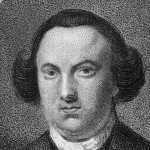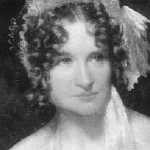(excerpt)
Sweet is the dew that falls betimes,
And drops upon the leafy limes;
Sweet Hermon's fragrant air:
Sweet is the lily's silver bell,
And sweet the wakeful tapers smell
That watch for early pray'r.
Sweet the young nurse with love intense,
Which smiles o'er sleeping innocence;
Sweet when the lost arrive:
Sweet the musician's ardour beats,
While his vague mind's in quest of sweets,
The choicest flow'rs to hive.
Sweeter in all the strains of love,
The language of thy turtle dove,
Pair'd to thy swelling chord;
Sweeter with ev'ry grace endu'd,
The glory of thy gratitude,
Respir'd unto the Lord.
Strong is the horse upon his speed;
Strong in pursuit the rapid glede,
Which makes at once his game:
Strong the tall ostrich on the ground;
Strong thro' the turbulent profound
Shoots xiphias to his aim.
Strong is the lion—like a coal
His eye-ball—like a bastion's mole
His chest against the foes:
Strong, the gier-eagle on his sail,
Strong against tide, th' enormous whale
Emerges as he goes.
But stronger still, in earth and air,
And in the sea, the man of pray'r;
And far beneath the tide;
And in the seat to faith assign'd,
Where ask is have, where seek is find,
Where knock is open wide.
Beauteous the fleet before the gale;
Beauteous the multitudes in mail,
Rank'd arms and crested heads:
Beauteous the garden's umbrage mild,
Walk, water, meditated wild,
And all the bloomy beds.
Beauteous the moon full on the lawn;
And beauteous, when the veil's withdrawn,
The virgin to her spouse:
Beauteous the temple deck'd and fill'd,
When to the heav'n of heav'ns they build
Their heart-directed vows.
Beauteous, yea beauteous more than these,
The shepherd king upon his knees,
For his momentous trust;
With wish of infinite conceit,
For man, beast, mute, the small and great,
And prostrate dust to dust.
Precious the bounteous widow's mite;
And precious, for extreme delight,
The largess from the churl:
Precious the ruby's blushing blaze,
And alba's blest imperial rays,
And pure cerulean pearl.
Precious the penitential tear;
And precious is the sigh sincere,
Acceptable to god:
And precious are the winning flow'rs,
In gladsome Israel's feast of bow'rs,
Bound on the hallow'd sod.
More precious that diviner part
Of David, ev'n the Lord's own heart,
Great, beautiful, and new:
In all things where it was intent,
In all extremes, in each event,
Proof—answ'ring true to true.
Glorious the sun in mid career;
Glorious th' assembled fires appear;
Glorious the comet's train:
Glorious the trumpet and alarm;
Glorious th' almighty stretch'd-out arm;
Glorious th' enraptur'd main:
Glorious the northern lights a-stream;
Glorious the song, when God's the theme;
Glorious the thunder's roar:
Glorious hosanna from the den;
Glorious the catholic amen;
Glorious the martyr's gore:
Glorious—more glorious is the crown
Of Him that brought salvation down
By meekness, call'd thy son;
Thou that stupendous truth believ'd,
And now the matchless deed's achiev'd,
Determin'd, dar'd, and done.



















Comment form: